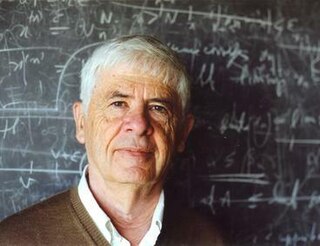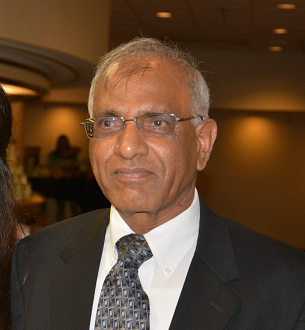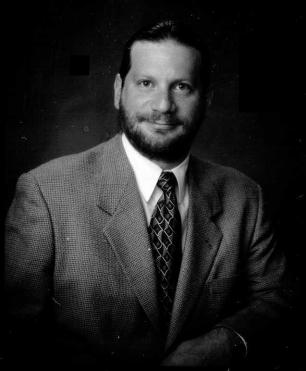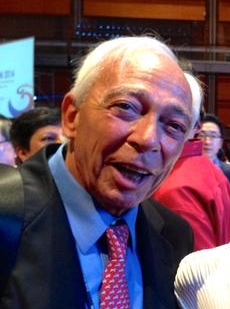
Calyampudi Radhakrishna Rao,, commonly known as C. R. Rao, is an Indian-American mathematician and statistician. He is currently professor emeritus at Pennsylvania State University and Research Professor at the University at Buffalo. Rao has been honoured by numerous colloquia, honorary degrees, and festschrifts and was awarded the US National Medal of Science in 2002. The American Statistical Association has described him as "a living legend whose work has influenced not just statistics, but has had far reaching implications for fields as varied as economics, genetics, anthropology, geology, national planning, demography, biometry, and medicine." The Times of India listed Rao as one of the top 10 Indian scientists of all time. In 2023, Rao was awarded the International Prize in Statistics, an award often touted as the "statistics’ equivalent of the Nobel Prize". Rao is also a Senior Policy and Statistics advisor for the Indian Heart Association non-profit focused on raising South Asian cardiovascular disease awareness.

The Courant Institute of Mathematical Sciences is the mathematics research school of New York University (NYU), and is among the most prestigious mathematics schools and mathematical sciences research centers in the world. Founded in 1935, it is named after Richard Courant, one of the founders of the Courant Institute and also a mathematics professor at New York University from 1936 to 1972, and serves as a center for research and advanced training in computer science and mathematics. It is located on Gould Plaza next to the Stern School of Business and the economics department of the College of Arts and Science.
Society for Industrial and Applied Mathematics (SIAM) is a professional society dedicated to applied mathematics, computational science, and data science through research, publications, and community. SIAM is the world's largest scientific society devoted to applied mathematics, and roughly two-thirds of its membership resides within the United States. Founded in 1951, the organization began holding annual national meetings in 1954, and now hosts conferences, publishes books and scholarly journals, and engages in advocacy in issues of interest to its membership. Members include engineers, scientists, and mathematicians, both those employed in academia and those working in industry. The society supports educational institutions promoting applied mathematics.

Alexandre Joel Chorin is an American mathematician known for his contributions to computational fluid mechanics, turbulence, and computational statistical mechanics.

Thomas Joseph Robert Hughes is a Professor of Aerospace Engineering and Engineering Mechanics and currently holds the Computational and Applied Mathematics Chair (III) at the Oden Institute at The University of Texas at Austin. Hughes has been listed as an ISI Highly Cited Author in Engineering by the ISI Web of Knowledge, Thomson Scientific Company.
Ivo M. Babuška was a Czech-American mathematician, noted for his studies of the finite element method and the proof of the Babuška–Lax–Milgram theorem in partial differential equations. One of the celebrated result in the finite elements is the so-called Ladyzenskaja–Babuška–Brezzi (LBB) condition, which provides sufficient conditions for a stable mixed formulation. The LBB condition has guided mathematicians and engineers to develop state-of-the-art formulations for many technologically important problems like Darcy flow, Stokes flow, incompressible Navier–Stokes, nearly incompressible elasticity.
Margaret H. Wright is an American computer scientist and mathematician. She is a Silver Professor of Computer Science and former Chair of the Computer Science department at Courant Institute of Mathematical Sciences, New York University, with research interests in optimization, linear algebra, and scientific computing. She was elected to the National Academy of Engineering in 1997 for development of numerical optimization algorithms and for leadership in the applied mathematics community. She was elected to the National Academy of Sciences in 2005. She was the first woman to serve as President of the Society for Industrial and Applied Mathematics.
Satya Atluri is an American engineer, educator, researcher and scientist in aerospace engineering, mechanical engineering and computational sciences, who is currently the Presidential Chair & University Distinguished Professor at Texas Tech University. Since 1966, he made fundamental contributions to the development of finite element methods, boundary element methods, Meshless Local Petrov-Galerkin (MLPG) methods, Fragile Points Methods (FPM), Local Variational Iteration Methods, for general problems of engineering, solid mechanics, fluid dynamics, heat transfer, flexoelectricity, ferromagnetics, gradient and nonlocal theories, nonlinear dynamics, shell theories, micromechanics of materials, structural integrity and damage tolerance, Orbital mechanics, Astrodynamics, etc.

Junuthula N. Reddy is a Distinguished Professor, Regent's Professor, and inaugural holder of the Oscar S. Wyatt Endowed Chair in Mechanical Engineering at Texas A&M University, College Station, Texas, USA.[1] He is an authoritative figure in the broad area of mechanics and one of the researchers responsible for the development of the Finite Element Method (FEM). He has made significant seminal contributions in the areas of finite element method, plate theory, solid mechanics, variational methods, mechanics of composites, functionally graded materials, fracture mechanics, plasticity, biomechanics, classical and non-Newtonian fluid mechanics, and applied functional analysis. Reddy has over 620 journal papers and 20 books and has given numerous national and international talks. He served as a member of the International Advisory Committee at ICTACEM, in 2001 and keynote addressing in 2014.[2][3]

Lawrence E. Hunter is a Professor and Director of the Center for Computational Pharmacology and of the Computational Bioscience Program at the University of Colorado School of Medicine and Professor of Computer Science at the University of Colorado Boulder. He is an internationally known scholar, focused on computational biology, knowledge-driven extraction of information from the primary biomedical literature, the semantic integration of knowledge resources in molecular biology, and the use of knowledge in the analysis of high-throughput data, as well as for his foundational work in computational biology, which led to the genesis of the major professional organization in the field and two international conferences.
Jianqing Fan is a statistician, financial econometrician, and writer. He is currently the Frederick L. Moore '18 Professor of Finance, a Professor of Statistics, and a former Chairman of Department of Operations Research and Financial Engineering (2012–2015) at Princeton University.
Leslie Frederick Greengard is an American mathematician, physicist and computer scientist. He is co-inventor with Vladimir Rokhlin Jr. of the fast multipole method (FMM) in 1987, recognized as one of the top-ten algorithms of the 20th century.

Tandy Warnow is an American computer scientist and Grainger Distinguished Chair in Engineering at the University of Illinois at Urbana–Champaign. She is known for her work on the reconstruction of evolutionary trees, both in biology and in historical linguistics, and also for multiple sequence alignment methods.
The following is a timeline of scientific computing, also known as computational science.

Franco Brezzi is an Italian mathematician.

Thomas Lengauer is a German computer scientist and computational biologist.
Keith A. Crandall is an American computational biologist, bioinformaticist, and population geneticist, at George Washington University, where he is the founding director of the Computational Biology Institute, and professor in the Department of Biostatistics and Bioinformatics.

Somnath Ghosh is the Michael G. Callas Chair Professor in the Department of Civil & Systems Engineering and a Professor of Mechanical Engineering and Materials Science & Engineering at Johns Hopkins University (JHU). He is the founding director of the JHU Center for Integrated Structure-Materials Modeling and Simulation (CISMMS) and was the director of an Air Force Center of Excellence in Integrated Materials Modeling (CEIMM). Prior to his appointment at JHU, Ghosh was the John B. Nordholt Professor of Mechanical Engineering and Materials Science & Engineering at Ohio State University. He is a fellow of several professional societies, including the American Association for the Advancement of Science (AAAS).
Jin-Yi Cai is a Chinese American mathematician and computer scientist. He is a professor of computer science, and also the Steenbock Professor of Mathematical Sciences at the University of Wisconsin–Madison. His research is in theoretical computer science, especially computational complexity theory. In recent years he has concentrated on the classification of computational counting problems, especially counting graph homomorphisms, counting constraint satisfaction problems, and Holant problems as related to holographic algorithms.

Gianluigi Rozza is an aerospace engineer and mathematician best known for his work on reduced-order modeling. He is currently full professor of Numerical Analysis at the International School for Advanced Studies (SISSA) in Trieste, where he serves as head of SISSA Mathematics Area and SISSA Director's Delegate for Research Valorisation, Innovation, and Industrial Cooperation.











